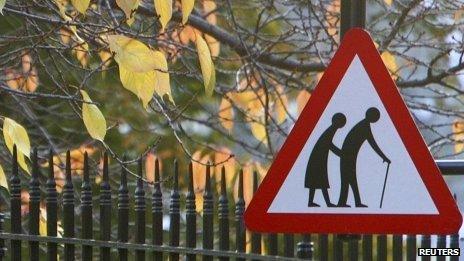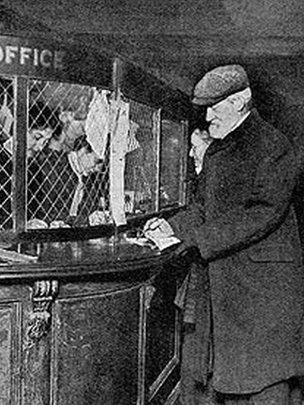Scottish independence: Pensioned off
- Published

Similar pension challenges lie ahead for the UK as it and Scotland/the rest of the UK as they could be after next year's referendum
There are snakes under the stone marked "pensions", which is one reason why I ignore it too often, and at my peril.
I'm not alone. On Monday, we'll get the latest from Lloyds Banking Group with its regular update on the woeful state of the nation's retirement planning.
However, I have lifted up the pensions rock for half an hour of enlightening chat with David Davison, an expert in the field, and director of Spence and Partners actuaries in Glasgow. You can see it in the latest of BBC Scotland's regular webcasts, looking in more detail at issues around the independence referendum.
It was, happily, snake-free. And what did I learn from it? Well, for starters, I got confirmation from the expert himself that pensions are "at best difficult and at worst impenetrable".
We also established that there's not much difference between the challenges facing the UK as it is, and Scotland/the rest of the UK as they could be after next year's referendum.
Growing older
The demographics point to us growing older, though not necessarily wiser about our retirement plans. Not only are people living longer, and therefore drawing pensions for longer, but career patterns have changed from the days for which the occupational pension scheme was devised.
If we've got a workplace pension at all, we're likely to have contributed to different schemes operated by different employers, and some of them by the same employer. We may have had some time of self-employment, and a combination of private and company pension schemes. So, it's become more complex.
And the gap between the funding available and the benefits expected to flow from them are probably a lot worse than when this was last measured, about four years ago. Not only have investments failed to perform, but the element funded from taxation (for public sector workers) has been hit by low economic growth, meaning the tax take is not as projected.

A separate Scottish state pension system would require a division of liabilities between governments
For those who will have their benefits defined by the contributions they've put in - which is the case with most modern workplace pension schemes, or at least those being started now - the cost of securing a living income has risen very substantially.
So it's not a happy picture. And how would that change under Scottish independence?
Well, there's one trend that wouldn't help Scotland. The demographics in England look more favourable, because there's more replacement of the workforce by immigrants than we've got in Scotland.
That makes the case for a Scottish government to use any new powers over immigration to encourage more young, productive, tax-paying incomers.
Otherwise, there would be one big challenge and one big question. The challenge is how to make the transition. That is, it's possible to say that an independent Scotland could or would have similar state, public sector and private pension schemes, but getting from here to there is complicated.
On the state pension, record-keeping is not that robust, according to David Davison. There is no record kept of where national insurance contributions have been made.
So given that people draw pensions depending on their working life contributions, there would have to be an agreement struck on sharing data, and making assumptions about where people have paid it.
If, for instance, your contributions have all been made in England while working in England, and you've then retired to Scotland (or vice versa), the two new governments would have to come to an agreement on how to handle the division of liabilities.
Public sector workers
Possibly more complex are public sector pensions. One of the questions we were sent for the pensions webcast raised the question of being paid and taxed at source from a pension fund in England, when tax in Scotland could be at a different rate. Pension administrators may have to levy different tax rates, as with employment payrolls.

The EU relented on a directive requiring pension funds that crossed borders to be fully funded
And what of someone whose career has straddled the border? In the NHS or the civil service, it's common to have spent part of your working life in Scotland and part of it in other parts of the UK. Other than local government employees (slightly more than half of the 950,000 or so in Scottish public sector schemes), your pension is not paid out of a funded pot of savings, but out of the taxes paid, by others, in each year of your retirement.
Disentangling the liabilities of two different nation's health services could prove very tricky, unless the two governments agree to make some bold assumptions and average things out.
Another reader of BBC Scotland news online asked about tax treaties. If you earn in one country, but live in another, the UK has a large number of treaties with other countries to ensure you don't get taxed twice. There would have to be such a treaty between Scotland and the rest of the UK.
But what about all the others? It's not in the gift of the UK Government to say that the same treaties will apply to an independent Scotland. Other governments around the world may simply continue current arrangements, or they may have reasons to delay or seek to amend the provisions.
Black holes
There's one complication that has become less challenging for the independence cause, according to Mr Davison. He was part of the team at the Institute of Chartered Accountants in Scotland, who published a report in April on pensions and independence.
One of the concerns it raised was a European directive which would require pension funds that cross the borders of member states to be fully funded. As you'll probably be aware, many funds currently carry large funding shortfalls - the difference between the funds currently available and the amount which should eventually be paid out.

The UK's pension system was devised more than a century ago
Filling in these black holes in pension schemes would be required for UK pension schemes that could find themselves, post-independence, straddling the border of two member states.
Or so it seemed in April. In May, the European Commission relented - probably fearing the immense impact on corporate and government balance sheets, and on growth, if it forced this issue.
Meanwhile, there's the question of the cross-border operations of pension providers - at which the Scottish financial sector does rather well.
A UK Treasury paper on independence and financial services suggested last month that pension providers might choose to locate south of the border, to be nearer the bulk of their customers.
Unless there's an outbreak of instability in regulation, or a change of currency, that claim may be overblown. David Davison reckoned that companies such as Standard Life may have to offer the same product in Scottish and "rest of UK" packaging. But there are good reasons for staying close to its Edinburgh roots and ensuring continuity.
Blue sky of retirement
Earlier, I mentioned not only the challenge of transition, but also one big question. And it's this: under independence, how different could Scotland's pension system be?
Once (or if) you get past the complexity of disentangling liabilities between two governments and, perhaps, two regulatory systems, how could a government based in Edinburgh steer pensions in a different direction.
The pension system we have was devised more than a century ago, with different challenges from poverty, different working life patterns and very much lower life expectancy.
If you were devising a system afresh, as governments in some emerging economies are doing, the equivalent of the 65-year old state pension age could be much higher than the age of 67 to which it is now heading. It could be closer to 80.
And would you want the state pension to be universal? There's a strong consensus around that in Britain, though pension credits have made it less so.
Would you target it where the need is greatest, meaning wealthier retired people get nothing? Or would you go the other way, towards a pension - perhaps combining state and private elements - that is not a floor income to fend off poverty, but related to your working life earnings?
There's a small team in St Andrew's House currently chewing through pencils as they try to figure out a pensions and welfare position for the Scottish Government. I wouldn't expect them to go for blue sky thinking like that. Their priority will be to provide reassurance that nothing much will change, and that no-one should be worse off after a "yes" vote.
But for those who want independence to mean a radically different Scotland, the blue sky of pensions policy offers some radically different choices.
Backlog blog
While I've been busy on both leave and other duties in recent weeks, that Treasury paper and the Scottish government's economic paper have been published, and much else besides.
We've reached a stage in the referendum campaign where serious contributions are coming in fast, and weighing heavily on the in-tray. I've got some catching up to do with my reading.
- Published22 May 2013

- Published8 May 2013

- Published8 May 2013